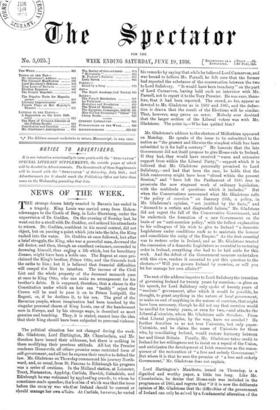Mr. Gladstone's address to the electors of Midlothian appeared on
Monday. He speaks of the issue to be submitted to the nation as "the gravest and likewise the simplest which has been submitted to it for half a century." He laments that the late Government did not itself propose to give Home-rule to Ireland. If they had, they would have received "warm and extensive support from within the Liberal Party,"—support which it is believed that Mr. Gladstone personally promised to Lord Salisbury,—and had that been the case, he holds that the Irish controversy might have been " closed within the present Session," and " have left the Parliament of 1885 free to prosecute the now stagnant work of ordinary legislation, with the multitude of questions which it includes." But when the Conservatives announced what Mr. Gladstone calls " the policy of coercion " on January 26th, a policy, in Mr. Gladstone's opinion, " not justified by the facts," and "doomed to a certain and disgraceful failure," Mr. Gladstone did not regret the fall of the Conservative Government, and he undertook the formation of a new Government on the basis of an " anti-coercion policy," with the fullest explanation to his colleagues of his wish to give to Ireland "a domestic Legislature under conditions such as to maintain the honour and consolidate the unity of the Empire." As the first essential was to restore order in Ireland, and as Mr. Gladstone treated the concession of a domestic Legislature as essential to restoring order in Ireland, everything else had to be laid aside for this work. And the defeat of the Government measure undertaken with this view, renders it essential to put this question to the electors,—" Will you govern Ireland by coercion, or will you let her manage her own affairs ?"




































